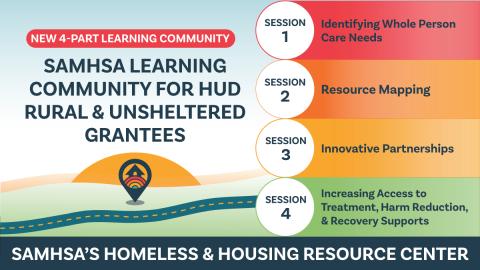Knowledge & Resources
Search and download a library of information and resources for health professionals and housing specialists.
Featured Article

This Learning Community for HUD Rural and Unsheltered grantees will focus on supporting Continuums of Care (CoCs) in understanding and building cross-system partnerships that address the needs of individuals and families impacted by substance use and/or mental disorders among those experiencing unsheltered homelessness and homelessness in rural areas.
Read MoreExplore The Resources
Filter
Clear AllResults
-
Toolkit Eviction Prevention: A Toolkit for Tenants and Service Providers
This Toolkit outlines strategies for supporting people with mental health conditions, substance use disorders, or co-occurring disorders living in community-based low-income housing to prevent eviction.
Article SAMHSA Learning Community for HUD Rural and Unsheltered Grantees
This Learning Community for HUD Rural and Unsheltered grantees will focus on supporting Continuums of Care (CoCs) in understanding and building cross-system partnerships that address the needs of individuals and families impacted by substance use and/or mental disorders among those experiencing unsheltered homelessness and homelessness in rural areas.
Fact Sheet Xylazine Basics: Overdose Prevention, Harm Reduction, and Wound Care
This document provides information on xylazine, a non-opioid veterinary tranquilizer used as an additive in illicit drug supplies, notably in combination with heroin and fentanyl.
-
Toolkit Expanding Peer Support Roles in Homeless Services Delivery: A Toolkit for Service Providers
Peer support is a fast-growing occupation in the behavioral health sector and homeless service organizations can also benefit from its value. This toolkit guides organizations looking to strengthen peers' integration into their workforce.
-
Toolkit Coordinating Systems of Care to Provide a Comprehensive Behavioral Health Crisis Response to Individuals Experiencing Homelessness
This brief suggests strategies to enhance crisis care through multilevel coordination and describes practical approaches that systems of care can deploy to strengthen collaboration.